Leadership and Management: Operational Context and Theories Evaluation
VerifiedAdded on 2020/06/05
|16
|4448
|33
Report
AI Summary
This report delves into the crucial aspects of leadership and management within the context of operational management, using Mulberry, a luxury fashion brand, as a case study. It begins by differentiating between the roles and characteristics of leaders and managers, highlighting their significance in achieving organizational goals. The report explores the application of leadership and management in various situational contexts, such as problem-solving, decision-making, and handling financial constraints. It then examines different leadership theories, including situational, systems, and contingency theories, evaluating their strengths and weaknesses. The analysis extends to key approaches in operational management, such as Business Process Redesign (BPR), reconfigurable manufacturing systems, and Six Sigma. The report critically evaluates the application of operational management principles and concludes with a comprehensive overview of the findings, emphasizing the importance of effective leadership and management in driving business success and adapting to a dynamic environment. Finally, the report explores different theories and models of approaches, their strengths and weaknesses, and critical analysis of different theories and approaches.
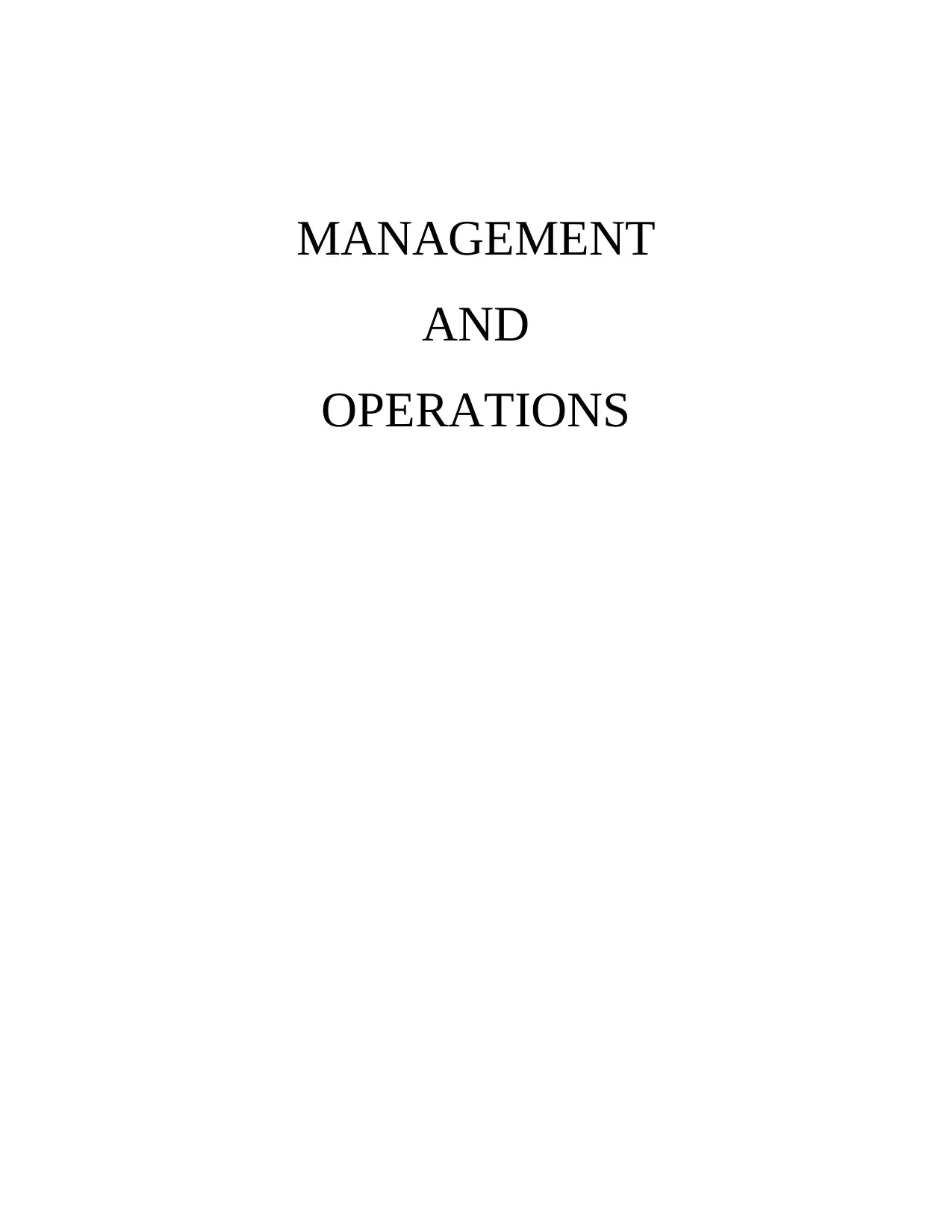
MANAGEMENT
AND
OPERATIONS
AND
OPERATIONS
Paraphrase This Document
Need a fresh take? Get an instant paraphrase of this document with our AI Paraphraser
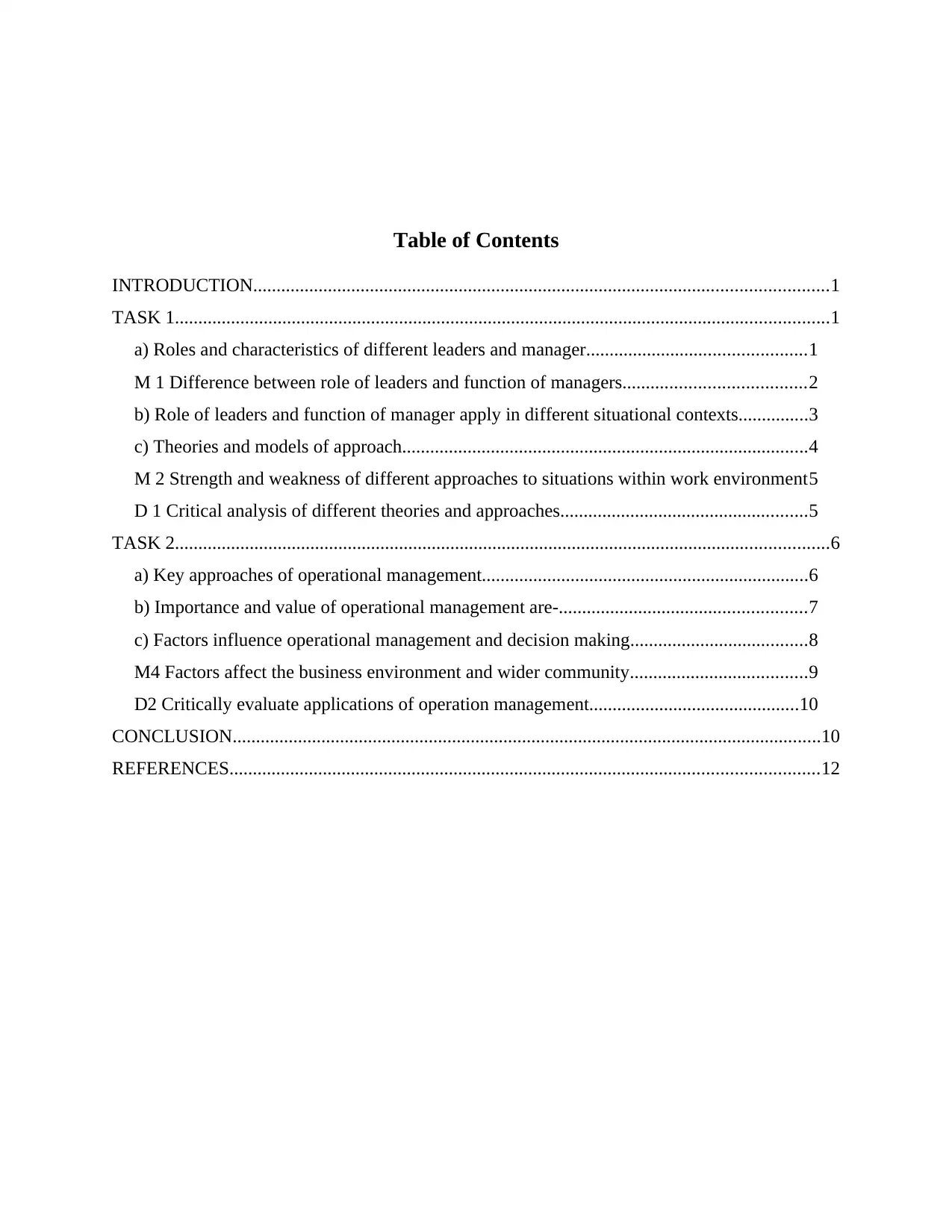
Table of Contents
INTRODUCTION...........................................................................................................................1
TASK 1............................................................................................................................................1
a) Roles and characteristics of different leaders and manager...............................................1
M 1 Difference between role of leaders and function of managers.......................................2
b) Role of leaders and function of manager apply in different situational contexts...............3
c) Theories and models of approach.......................................................................................4
M 2 Strength and weakness of different approaches to situations within work environment5
D 1 Critical analysis of different theories and approaches.....................................................5
TASK 2............................................................................................................................................6
a) Key approaches of operational management......................................................................6
b) Importance and value of operational management are-.....................................................7
c) Factors influence operational management and decision making......................................8
M4 Factors affect the business environment and wider community......................................9
D2 Critically evaluate applications of operation management.............................................10
CONCLUSION..............................................................................................................................10
REFERENCES..............................................................................................................................12
INTRODUCTION...........................................................................................................................1
TASK 1............................................................................................................................................1
a) Roles and characteristics of different leaders and manager...............................................1
M 1 Difference between role of leaders and function of managers.......................................2
b) Role of leaders and function of manager apply in different situational contexts...............3
c) Theories and models of approach.......................................................................................4
M 2 Strength and weakness of different approaches to situations within work environment5
D 1 Critical analysis of different theories and approaches.....................................................5
TASK 2............................................................................................................................................6
a) Key approaches of operational management......................................................................6
b) Importance and value of operational management are-.....................................................7
c) Factors influence operational management and decision making......................................8
M4 Factors affect the business environment and wider community......................................9
D2 Critically evaluate applications of operation management.............................................10
CONCLUSION..............................................................................................................................10
REFERENCES..............................................................................................................................12

⊘ This is a preview!⊘
Do you want full access?
Subscribe today to unlock all pages.

Trusted by 1+ million students worldwide
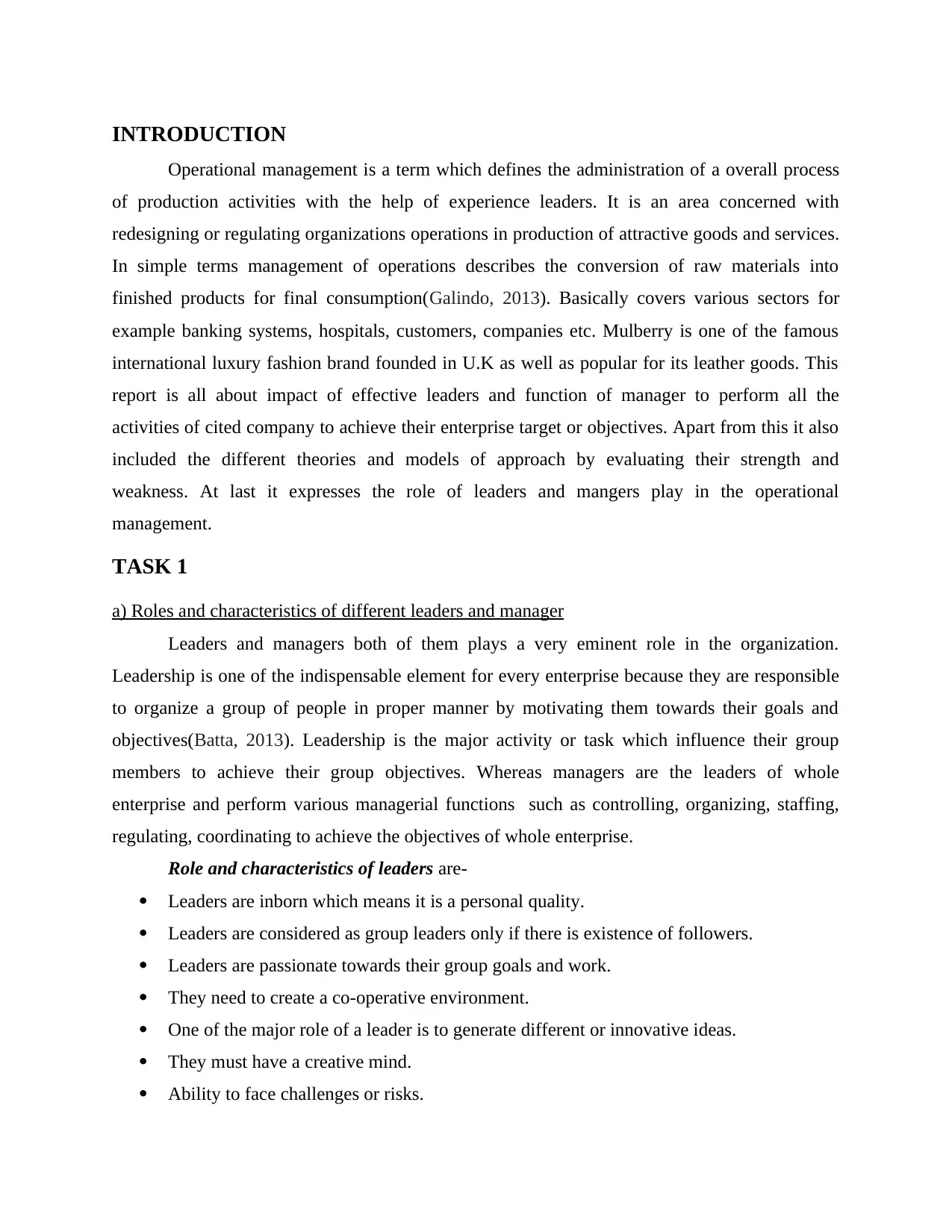
INTRODUCTION
Operational management is a term which defines the administration of a overall process
of production activities with the help of experience leaders. It is an area concerned with
redesigning or regulating organizations operations in production of attractive goods and services.
In simple terms management of operations describes the conversion of raw materials into
finished products for final consumption(Galindo, 2013). Basically covers various sectors for
example banking systems, hospitals, customers, companies etc. Mulberry is one of the famous
international luxury fashion brand founded in U.K as well as popular for its leather goods. This
report is all about impact of effective leaders and function of manager to perform all the
activities of cited company to achieve their enterprise target or objectives. Apart from this it also
included the different theories and models of approach by evaluating their strength and
weakness. At last it expresses the role of leaders and mangers play in the operational
management.
TASK 1
a) Roles and characteristics of different leaders and manager
Leaders and managers both of them plays a very eminent role in the organization.
Leadership is one of the indispensable element for every enterprise because they are responsible
to organize a group of people in proper manner by motivating them towards their goals and
objectives(Batta, 2013). Leadership is the major activity or task which influence their group
members to achieve their group objectives. Whereas managers are the leaders of whole
enterprise and perform various managerial functions such as controlling, organizing, staffing,
regulating, coordinating to achieve the objectives of whole enterprise.
Role and characteristics of leaders are-
Leaders are inborn which means it is a personal quality.
Leaders are considered as group leaders only if there is existence of followers.
Leaders are passionate towards their group goals and work.
They need to create a co-operative environment.
One of the major role of a leader is to generate different or innovative ideas.
They must have a creative mind.
Ability to face challenges or risks.
Operational management is a term which defines the administration of a overall process
of production activities with the help of experience leaders. It is an area concerned with
redesigning or regulating organizations operations in production of attractive goods and services.
In simple terms management of operations describes the conversion of raw materials into
finished products for final consumption(Galindo, 2013). Basically covers various sectors for
example banking systems, hospitals, customers, companies etc. Mulberry is one of the famous
international luxury fashion brand founded in U.K as well as popular for its leather goods. This
report is all about impact of effective leaders and function of manager to perform all the
activities of cited company to achieve their enterprise target or objectives. Apart from this it also
included the different theories and models of approach by evaluating their strength and
weakness. At last it expresses the role of leaders and mangers play in the operational
management.
TASK 1
a) Roles and characteristics of different leaders and manager
Leaders and managers both of them plays a very eminent role in the organization.
Leadership is one of the indispensable element for every enterprise because they are responsible
to organize a group of people in proper manner by motivating them towards their goals and
objectives(Batta, 2013). Leadership is the major activity or task which influence their group
members to achieve their group objectives. Whereas managers are the leaders of whole
enterprise and perform various managerial functions such as controlling, organizing, staffing,
regulating, coordinating to achieve the objectives of whole enterprise.
Role and characteristics of leaders are-
Leaders are inborn which means it is a personal quality.
Leaders are considered as group leaders only if there is existence of followers.
Leaders are passionate towards their group goals and work.
They need to create a co-operative environment.
One of the major role of a leader is to generate different or innovative ideas.
They must have a creative mind.
Ability to face challenges or risks.
Paraphrase This Document
Need a fresh take? Get an instant paraphrase of this document with our AI Paraphraser
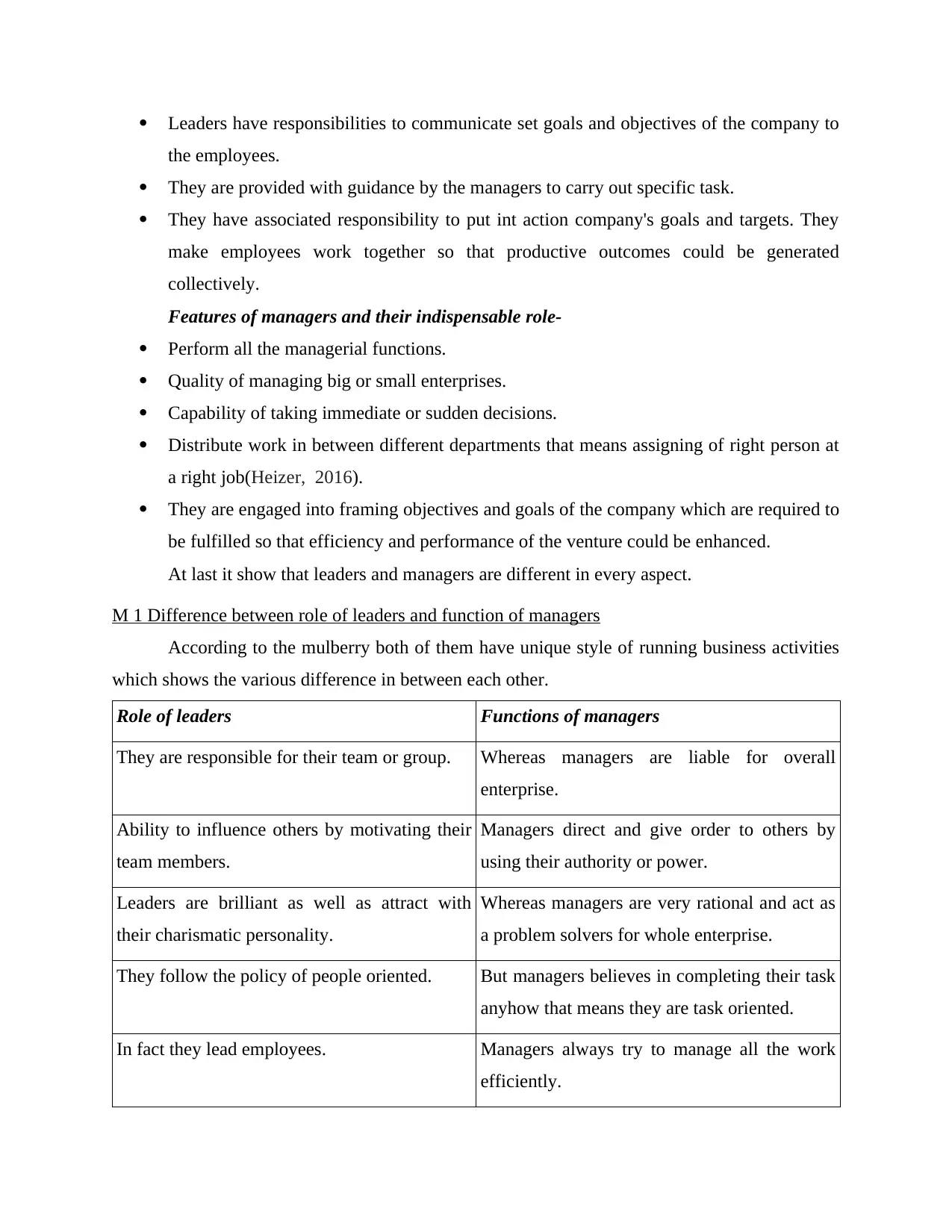
Leaders have responsibilities to communicate set goals and objectives of the company to
the employees.
They are provided with guidance by the managers to carry out specific task.
They have associated responsibility to put int action company's goals and targets. They
make employees work together so that productive outcomes could be generated
collectively.
Features of managers and their indispensable role-
Perform all the managerial functions.
Quality of managing big or small enterprises.
Capability of taking immediate or sudden decisions.
Distribute work in between different departments that means assigning of right person at
a right job(Heizer, 2016).
They are engaged into framing objectives and goals of the company which are required to
be fulfilled so that efficiency and performance of the venture could be enhanced.
At last it show that leaders and managers are different in every aspect.
M 1 Difference between role of leaders and function of managers
According to the mulberry both of them have unique style of running business activities
which shows the various difference in between each other.
Role of leaders Functions of managers
They are responsible for their team or group. Whereas managers are liable for overall
enterprise.
Ability to influence others by motivating their
team members.
Managers direct and give order to others by
using their authority or power.
Leaders are brilliant as well as attract with
their charismatic personality.
Whereas managers are very rational and act as
a problem solvers for whole enterprise.
They follow the policy of people oriented. But managers believes in completing their task
anyhow that means they are task oriented.
In fact they lead employees. Managers always try to manage all the work
efficiently.
the employees.
They are provided with guidance by the managers to carry out specific task.
They have associated responsibility to put int action company's goals and targets. They
make employees work together so that productive outcomes could be generated
collectively.
Features of managers and their indispensable role-
Perform all the managerial functions.
Quality of managing big or small enterprises.
Capability of taking immediate or sudden decisions.
Distribute work in between different departments that means assigning of right person at
a right job(Heizer, 2016).
They are engaged into framing objectives and goals of the company which are required to
be fulfilled so that efficiency and performance of the venture could be enhanced.
At last it show that leaders and managers are different in every aspect.
M 1 Difference between role of leaders and function of managers
According to the mulberry both of them have unique style of running business activities
which shows the various difference in between each other.
Role of leaders Functions of managers
They are responsible for their team or group. Whereas managers are liable for overall
enterprise.
Ability to influence others by motivating their
team members.
Managers direct and give order to others by
using their authority or power.
Leaders are brilliant as well as attract with
their charismatic personality.
Whereas managers are very rational and act as
a problem solvers for whole enterprise.
They follow the policy of people oriented. But managers believes in completing their task
anyhow that means they are task oriented.
In fact they lead employees. Managers always try to manage all the work
efficiently.
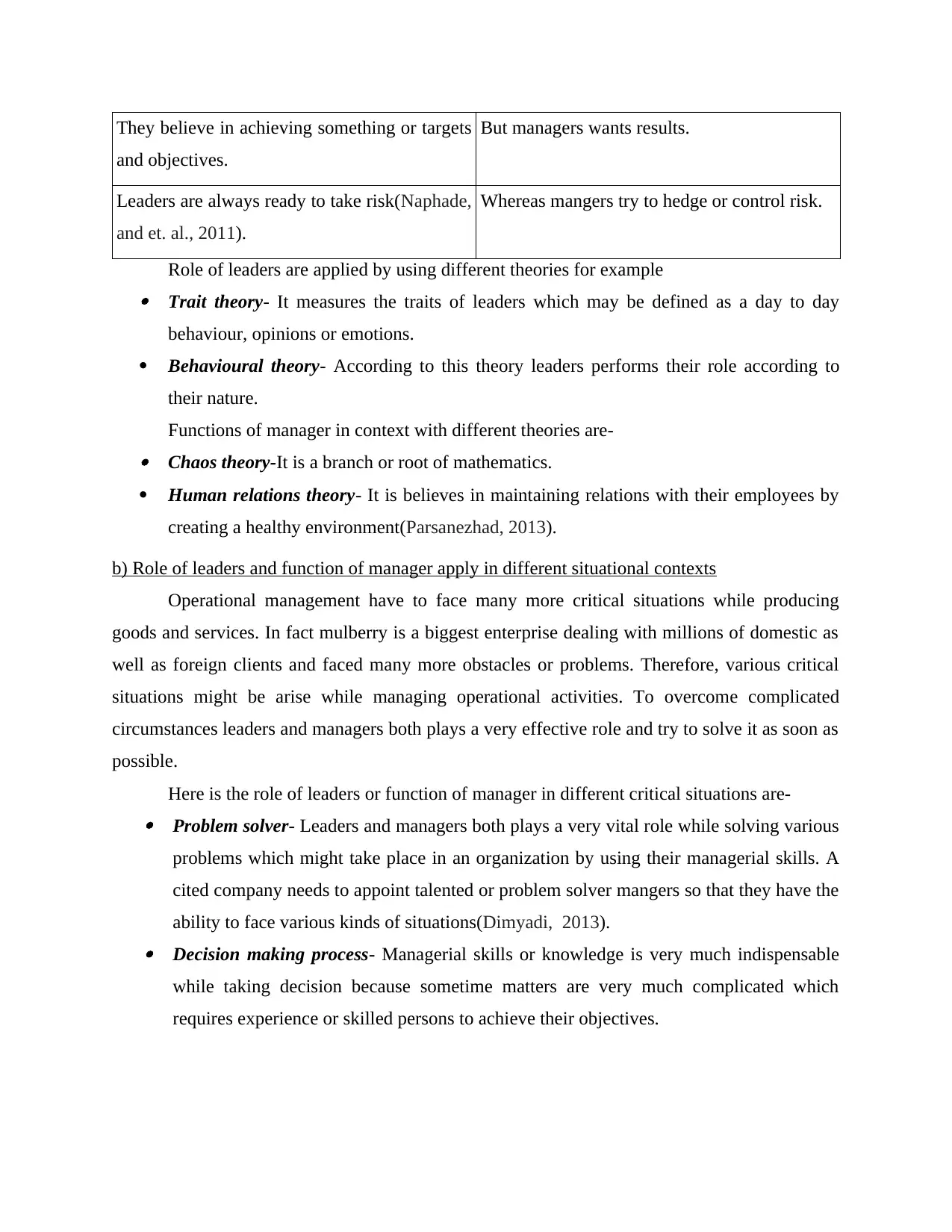
They believe in achieving something or targets
and objectives.
But managers wants results.
Leaders are always ready to take risk(Naphade,
and et. al., 2011).
Whereas mangers try to hedge or control risk.
Role of leaders are applied by using different theories for example Trait theory- It measures the traits of leaders which may be defined as a day to day
behaviour, opinions or emotions.
Behavioural theory- According to this theory leaders performs their role according to
their nature.
Functions of manager in context with different theories are- Chaos theory-It is a branch or root of mathematics.
Human relations theory- It is believes in maintaining relations with their employees by
creating a healthy environment(Parsanezhad, 2013).
b) Role of leaders and function of manager apply in different situational contexts
Operational management have to face many more critical situations while producing
goods and services. In fact mulberry is a biggest enterprise dealing with millions of domestic as
well as foreign clients and faced many more obstacles or problems. Therefore, various critical
situations might be arise while managing operational activities. To overcome complicated
circumstances leaders and managers both plays a very effective role and try to solve it as soon as
possible.
Here is the role of leaders or function of manager in different critical situations are- Problem solver- Leaders and managers both plays a very vital role while solving various
problems which might take place in an organization by using their managerial skills. A
cited company needs to appoint talented or problem solver mangers so that they have the
ability to face various kinds of situations(Dimyadi, 2013). Decision making process- Managerial skills or knowledge is very much indispensable
while taking decision because sometime matters are very much complicated which
requires experience or skilled persons to achieve their objectives.
and objectives.
But managers wants results.
Leaders are always ready to take risk(Naphade,
and et. al., 2011).
Whereas mangers try to hedge or control risk.
Role of leaders are applied by using different theories for example Trait theory- It measures the traits of leaders which may be defined as a day to day
behaviour, opinions or emotions.
Behavioural theory- According to this theory leaders performs their role according to
their nature.
Functions of manager in context with different theories are- Chaos theory-It is a branch or root of mathematics.
Human relations theory- It is believes in maintaining relations with their employees by
creating a healthy environment(Parsanezhad, 2013).
b) Role of leaders and function of manager apply in different situational contexts
Operational management have to face many more critical situations while producing
goods and services. In fact mulberry is a biggest enterprise dealing with millions of domestic as
well as foreign clients and faced many more obstacles or problems. Therefore, various critical
situations might be arise while managing operational activities. To overcome complicated
circumstances leaders and managers both plays a very effective role and try to solve it as soon as
possible.
Here is the role of leaders or function of manager in different critical situations are- Problem solver- Leaders and managers both plays a very vital role while solving various
problems which might take place in an organization by using their managerial skills. A
cited company needs to appoint talented or problem solver mangers so that they have the
ability to face various kinds of situations(Dimyadi, 2013). Decision making process- Managerial skills or knowledge is very much indispensable
while taking decision because sometime matters are very much complicated which
requires experience or skilled persons to achieve their objectives.
⊘ This is a preview!⊘
Do you want full access?
Subscribe today to unlock all pages.

Trusted by 1+ million students worldwide
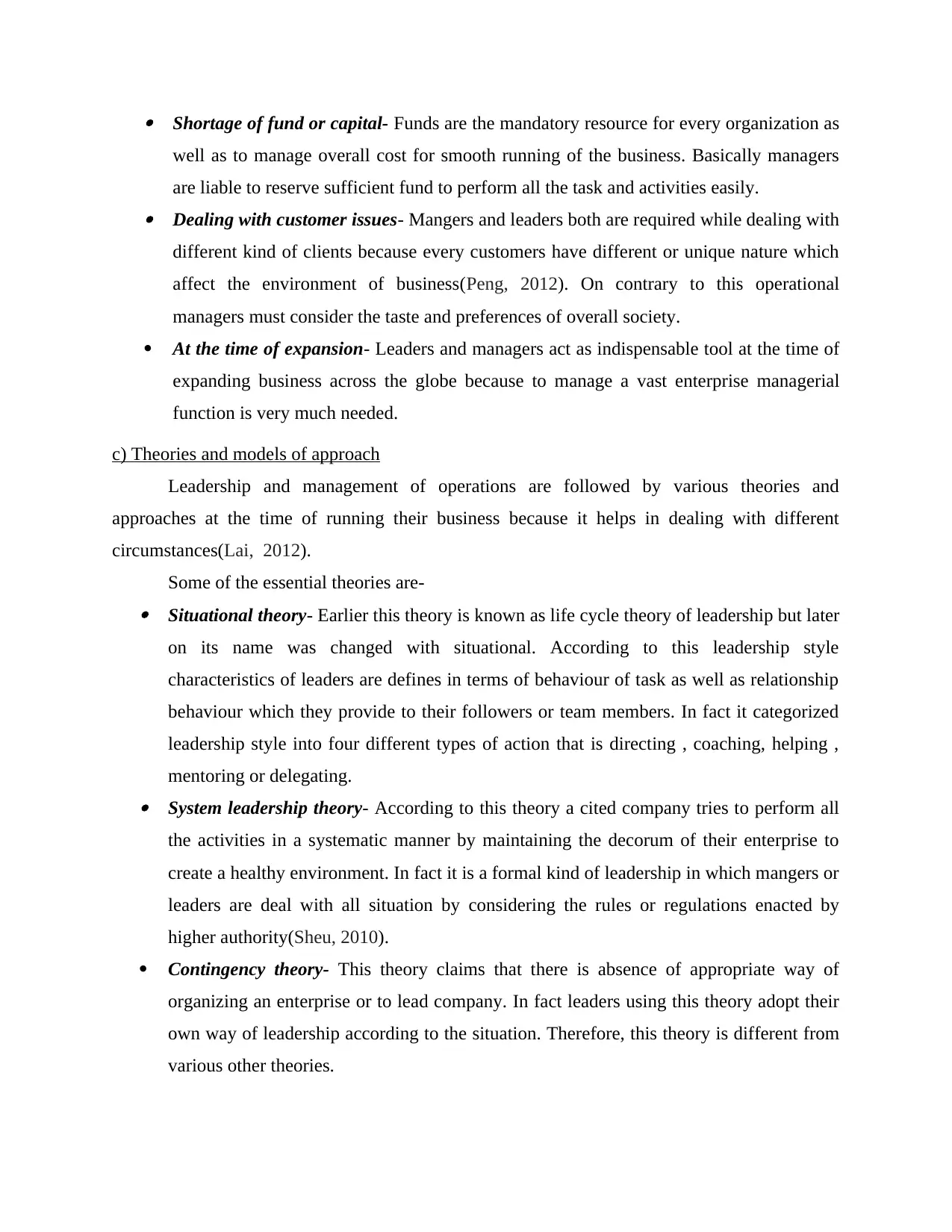
Shortage of fund or capital- Funds are the mandatory resource for every organization as
well as to manage overall cost for smooth running of the business. Basically managers
are liable to reserve sufficient fund to perform all the task and activities easily. Dealing with customer issues- Mangers and leaders both are required while dealing with
different kind of clients because every customers have different or unique nature which
affect the environment of business(Peng, 2012). On contrary to this operational
managers must consider the taste and preferences of overall society.
At the time of expansion- Leaders and managers act as indispensable tool at the time of
expanding business across the globe because to manage a vast enterprise managerial
function is very much needed.
c) Theories and models of approach
Leadership and management of operations are followed by various theories and
approaches at the time of running their business because it helps in dealing with different
circumstances(Lai, 2012).
Some of the essential theories are- Situational theory- Earlier this theory is known as life cycle theory of leadership but later
on its name was changed with situational. According to this leadership style
characteristics of leaders are defines in terms of behaviour of task as well as relationship
behaviour which they provide to their followers or team members. In fact it categorized
leadership style into four different types of action that is directing , coaching, helping ,
mentoring or delegating. System leadership theory- According to this theory a cited company tries to perform all
the activities in a systematic manner by maintaining the decorum of their enterprise to
create a healthy environment. In fact it is a formal kind of leadership in which mangers or
leaders are deal with all situation by considering the rules or regulations enacted by
higher authority(Sheu, 2010).
Contingency theory- This theory claims that there is absence of appropriate way of
organizing an enterprise or to lead company. In fact leaders using this theory adopt their
own way of leadership according to the situation. Therefore, this theory is different from
various other theories.
well as to manage overall cost for smooth running of the business. Basically managers
are liable to reserve sufficient fund to perform all the task and activities easily. Dealing with customer issues- Mangers and leaders both are required while dealing with
different kind of clients because every customers have different or unique nature which
affect the environment of business(Peng, 2012). On contrary to this operational
managers must consider the taste and preferences of overall society.
At the time of expansion- Leaders and managers act as indispensable tool at the time of
expanding business across the globe because to manage a vast enterprise managerial
function is very much needed.
c) Theories and models of approach
Leadership and management of operations are followed by various theories and
approaches at the time of running their business because it helps in dealing with different
circumstances(Lai, 2012).
Some of the essential theories are- Situational theory- Earlier this theory is known as life cycle theory of leadership but later
on its name was changed with situational. According to this leadership style
characteristics of leaders are defines in terms of behaviour of task as well as relationship
behaviour which they provide to their followers or team members. In fact it categorized
leadership style into four different types of action that is directing , coaching, helping ,
mentoring or delegating. System leadership theory- According to this theory a cited company tries to perform all
the activities in a systematic manner by maintaining the decorum of their enterprise to
create a healthy environment. In fact it is a formal kind of leadership in which mangers or
leaders are deal with all situation by considering the rules or regulations enacted by
higher authority(Sheu, 2010).
Contingency theory- This theory claims that there is absence of appropriate way of
organizing an enterprise or to lead company. In fact leaders using this theory adopt their
own way of leadership according to the situation. Therefore, this theory is different from
various other theories.
Paraphrase This Document
Need a fresh take? Get an instant paraphrase of this document with our AI Paraphraser
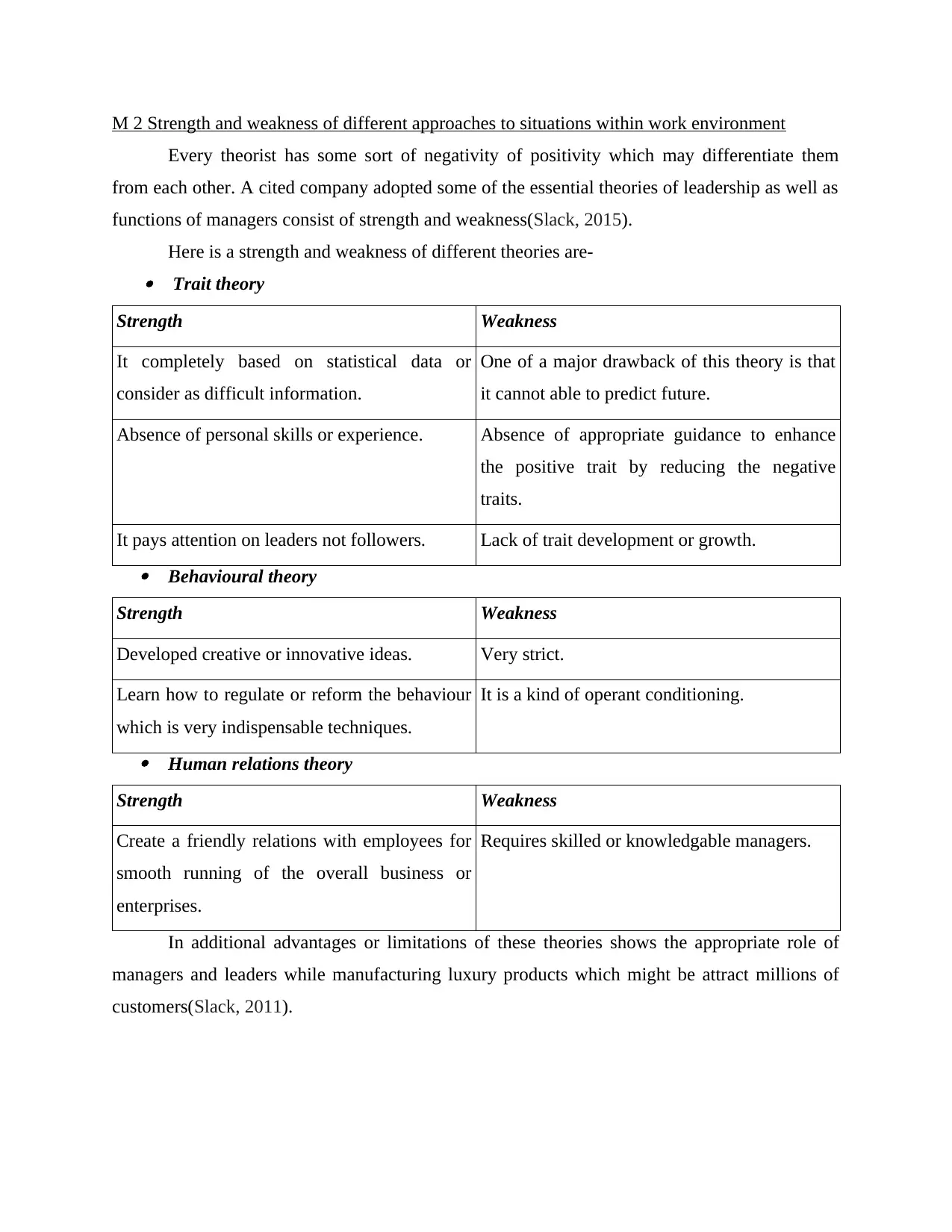
M 2 Strength and weakness of different approaches to situations within work environment
Every theorist has some sort of negativity of positivity which may differentiate them
from each other. A cited company adopted some of the essential theories of leadership as well as
functions of managers consist of strength and weakness(Slack, 2015).
Here is a strength and weakness of different theories are- Trait theory
Strength Weakness
It completely based on statistical data or
consider as difficult information.
One of a major drawback of this theory is that
it cannot able to predict future.
Absence of personal skills or experience. Absence of appropriate guidance to enhance
the positive trait by reducing the negative
traits.
It pays attention on leaders not followers. Lack of trait development or growth. Behavioural theory
Strength Weakness
Developed creative or innovative ideas. Very strict.
Learn how to regulate or reform the behaviour
which is very indispensable techniques.
It is a kind of operant conditioning.
Human relations theory
Strength Weakness
Create a friendly relations with employees for
smooth running of the overall business or
enterprises.
Requires skilled or knowledgable managers.
In additional advantages or limitations of these theories shows the appropriate role of
managers and leaders while manufacturing luxury products which might be attract millions of
customers(Slack, 2011).
Every theorist has some sort of negativity of positivity which may differentiate them
from each other. A cited company adopted some of the essential theories of leadership as well as
functions of managers consist of strength and weakness(Slack, 2015).
Here is a strength and weakness of different theories are- Trait theory
Strength Weakness
It completely based on statistical data or
consider as difficult information.
One of a major drawback of this theory is that
it cannot able to predict future.
Absence of personal skills or experience. Absence of appropriate guidance to enhance
the positive trait by reducing the negative
traits.
It pays attention on leaders not followers. Lack of trait development or growth. Behavioural theory
Strength Weakness
Developed creative or innovative ideas. Very strict.
Learn how to regulate or reform the behaviour
which is very indispensable techniques.
It is a kind of operant conditioning.
Human relations theory
Strength Weakness
Create a friendly relations with employees for
smooth running of the overall business or
enterprises.
Requires skilled or knowledgable managers.
In additional advantages or limitations of these theories shows the appropriate role of
managers and leaders while manufacturing luxury products which might be attract millions of
customers(Slack, 2011).
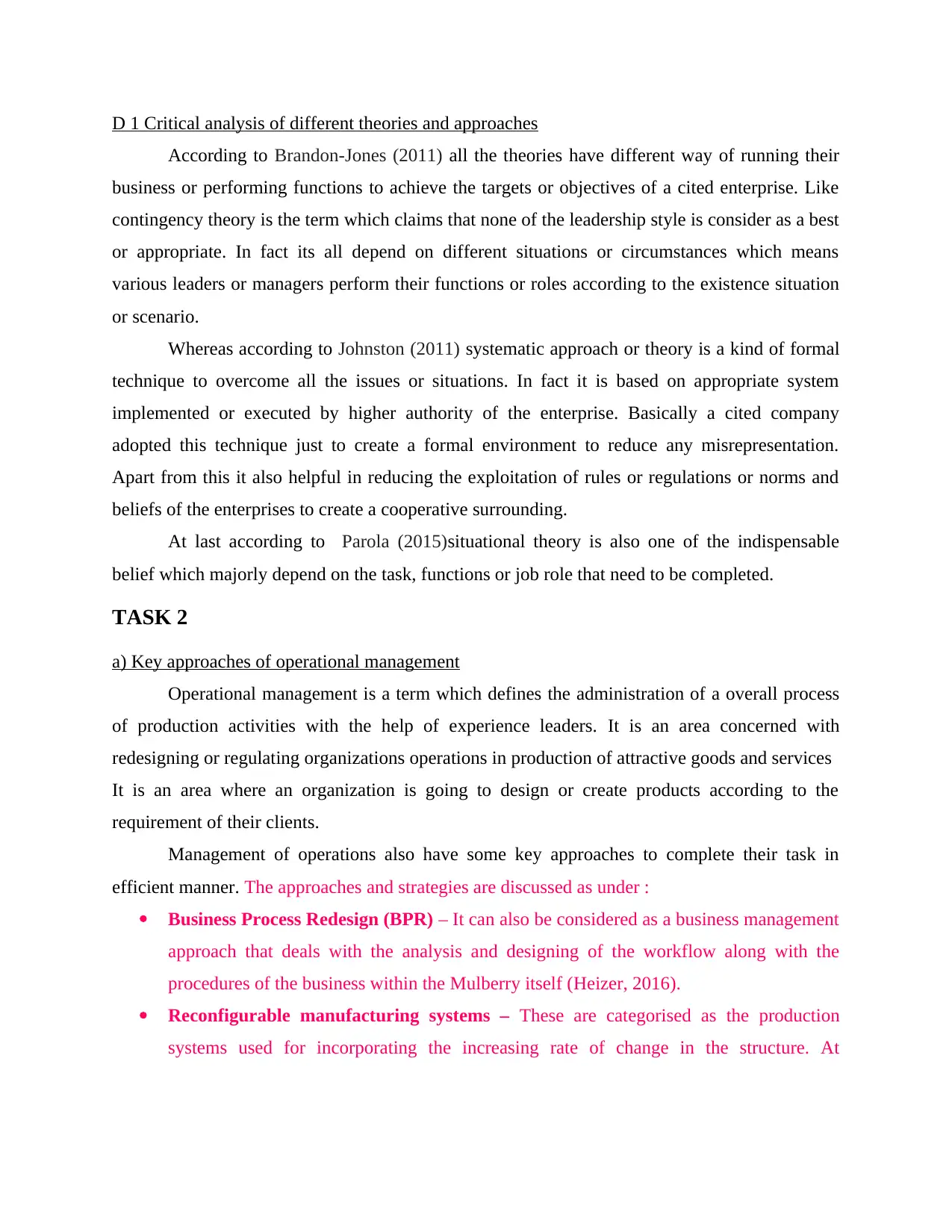
D 1 Critical analysis of different theories and approaches
According to Brandon-Jones (2011) all the theories have different way of running their
business or performing functions to achieve the targets or objectives of a cited enterprise. Like
contingency theory is the term which claims that none of the leadership style is consider as a best
or appropriate. In fact its all depend on different situations or circumstances which means
various leaders or managers perform their functions or roles according to the existence situation
or scenario.
Whereas according to Johnston (2011) systematic approach or theory is a kind of formal
technique to overcome all the issues or situations. In fact it is based on appropriate system
implemented or executed by higher authority of the enterprise. Basically a cited company
adopted this technique just to create a formal environment to reduce any misrepresentation.
Apart from this it also helpful in reducing the exploitation of rules or regulations or norms and
beliefs of the enterprises to create a cooperative surrounding.
At last according to Parola (2015)situational theory is also one of the indispensable
belief which majorly depend on the task, functions or job role that need to be completed.
TASK 2
a) Key approaches of operational management
Operational management is a term which defines the administration of a overall process
of production activities with the help of experience leaders. It is an area concerned with
redesigning or regulating organizations operations in production of attractive goods and services
It is an area where an organization is going to design or create products according to the
requirement of their clients.
Management of operations also have some key approaches to complete their task in
efficient manner. The approaches and strategies are discussed as under :
Business Process Redesign (BPR) – It can also be considered as a business management
approach that deals with the analysis and designing of the workflow along with the
procedures of the business within the Mulberry itself (Heizer, 2016).
Reconfigurable manufacturing systems – These are categorised as the production
systems used for incorporating the increasing rate of change in the structure. At
According to Brandon-Jones (2011) all the theories have different way of running their
business or performing functions to achieve the targets or objectives of a cited enterprise. Like
contingency theory is the term which claims that none of the leadership style is consider as a best
or appropriate. In fact its all depend on different situations or circumstances which means
various leaders or managers perform their functions or roles according to the existence situation
or scenario.
Whereas according to Johnston (2011) systematic approach or theory is a kind of formal
technique to overcome all the issues or situations. In fact it is based on appropriate system
implemented or executed by higher authority of the enterprise. Basically a cited company
adopted this technique just to create a formal environment to reduce any misrepresentation.
Apart from this it also helpful in reducing the exploitation of rules or regulations or norms and
beliefs of the enterprises to create a cooperative surrounding.
At last according to Parola (2015)situational theory is also one of the indispensable
belief which majorly depend on the task, functions or job role that need to be completed.
TASK 2
a) Key approaches of operational management
Operational management is a term which defines the administration of a overall process
of production activities with the help of experience leaders. It is an area concerned with
redesigning or regulating organizations operations in production of attractive goods and services
It is an area where an organization is going to design or create products according to the
requirement of their clients.
Management of operations also have some key approaches to complete their task in
efficient manner. The approaches and strategies are discussed as under :
Business Process Redesign (BPR) – It can also be considered as a business management
approach that deals with the analysis and designing of the workflow along with the
procedures of the business within the Mulberry itself (Heizer, 2016).
Reconfigurable manufacturing systems – These are categorised as the production
systems used for incorporating the increasing rate of change in the structure. At
⊘ This is a preview!⊘
Do you want full access?
Subscribe today to unlock all pages.

Trusted by 1+ million students worldwide
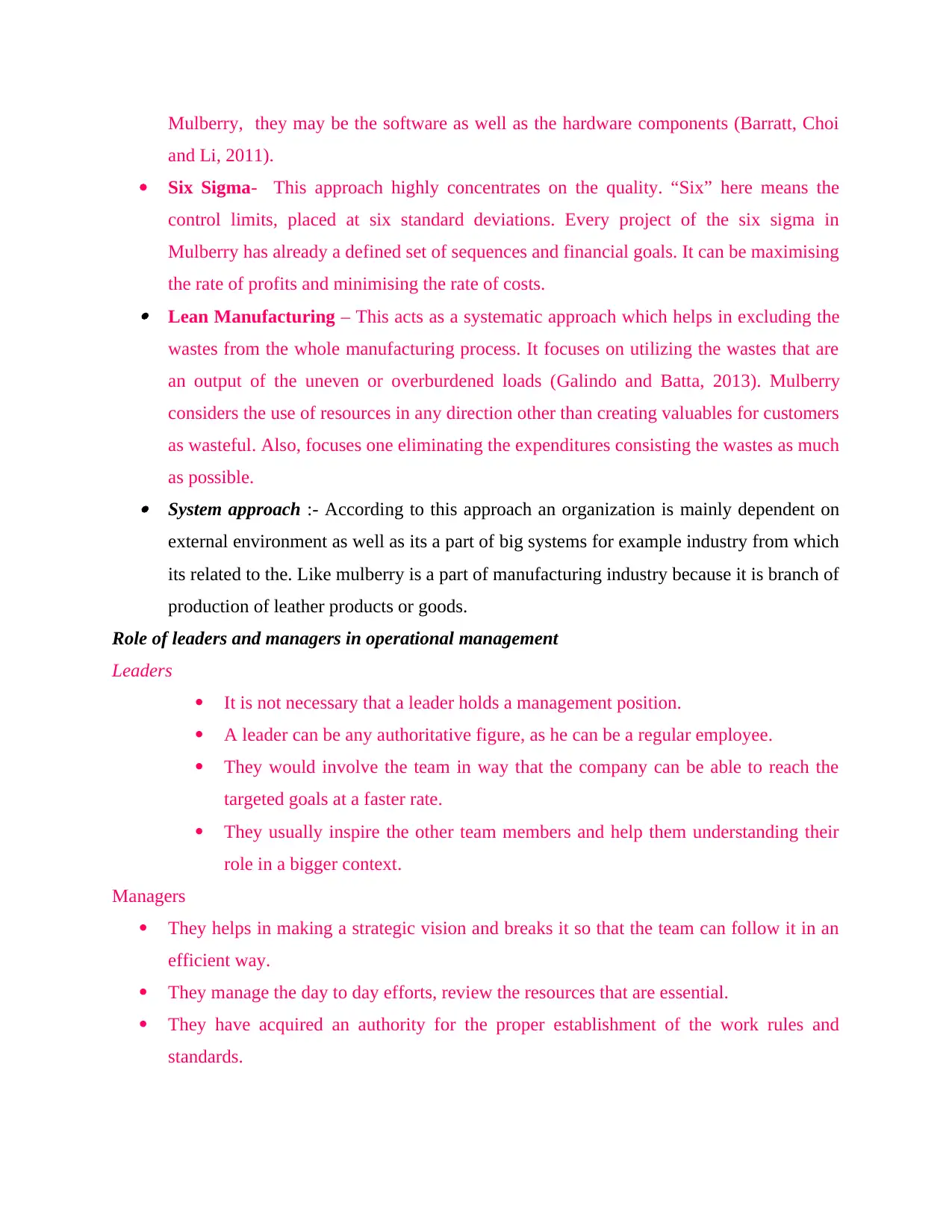
Mulberry, they may be the software as well as the hardware components (Barratt, Choi
and Li, 2011).
Six Sigma- This approach highly concentrates on the quality. “Six” here means the
control limits, placed at six standard deviations. Every project of the six sigma in
Mulberry has already a defined set of sequences and financial goals. It can be maximising
the rate of profits and minimising the rate of costs. Lean Manufacturing – This acts as a systematic approach which helps in excluding the
wastes from the whole manufacturing process. It focuses on utilizing the wastes that are
an output of the uneven or overburdened loads (Galindo and Batta, 2013). Mulberry
considers the use of resources in any direction other than creating valuables for customers
as wasteful. Also, focuses one eliminating the expenditures consisting the wastes as much
as possible. System approach :- According to this approach an organization is mainly dependent on
external environment as well as its a part of big systems for example industry from which
its related to the. Like mulberry is a part of manufacturing industry because it is branch of
production of leather products or goods.
Role of leaders and managers in operational management
Leaders
It is not necessary that a leader holds a management position.
A leader can be any authoritative figure, as he can be a regular employee.
They would involve the team in way that the company can be able to reach the
targeted goals at a faster rate.
They usually inspire the other team members and help them understanding their
role in a bigger context.
Managers
They helps in making a strategic vision and breaks it so that the team can follow it in an
efficient way.
They manage the day to day efforts, review the resources that are essential.
They have acquired an authority for the proper establishment of the work rules and
standards.
and Li, 2011).
Six Sigma- This approach highly concentrates on the quality. “Six” here means the
control limits, placed at six standard deviations. Every project of the six sigma in
Mulberry has already a defined set of sequences and financial goals. It can be maximising
the rate of profits and minimising the rate of costs. Lean Manufacturing – This acts as a systematic approach which helps in excluding the
wastes from the whole manufacturing process. It focuses on utilizing the wastes that are
an output of the uneven or overburdened loads (Galindo and Batta, 2013). Mulberry
considers the use of resources in any direction other than creating valuables for customers
as wasteful. Also, focuses one eliminating the expenditures consisting the wastes as much
as possible. System approach :- According to this approach an organization is mainly dependent on
external environment as well as its a part of big systems for example industry from which
its related to the. Like mulberry is a part of manufacturing industry because it is branch of
production of leather products or goods.
Role of leaders and managers in operational management
Leaders
It is not necessary that a leader holds a management position.
A leader can be any authoritative figure, as he can be a regular employee.
They would involve the team in way that the company can be able to reach the
targeted goals at a faster rate.
They usually inspire the other team members and help them understanding their
role in a bigger context.
Managers
They helps in making a strategic vision and breaks it so that the team can follow it in an
efficient way.
They manage the day to day efforts, review the resources that are essential.
They have acquired an authority for the proper establishment of the work rules and
standards.
Paraphrase This Document
Need a fresh take? Get an instant paraphrase of this document with our AI Paraphraser
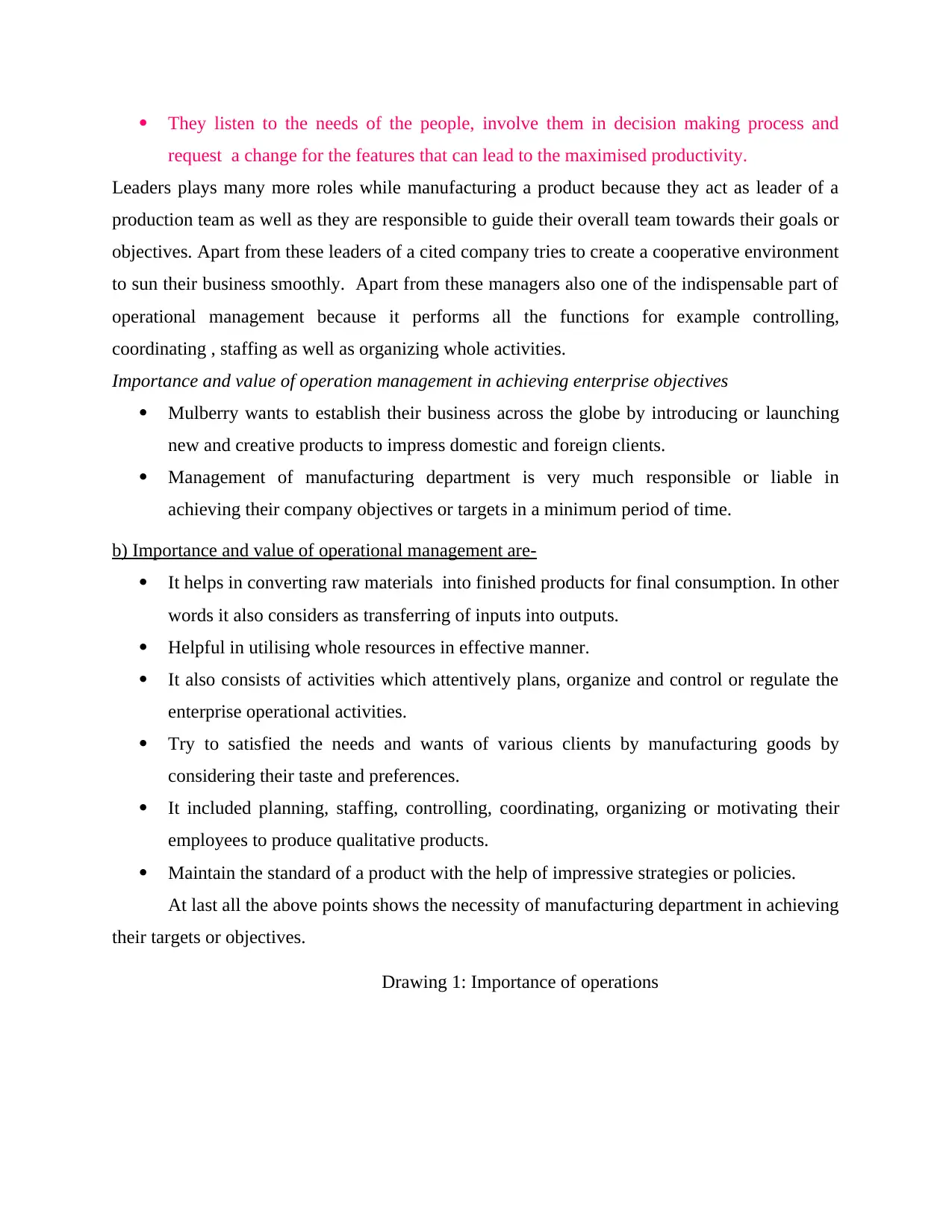
They listen to the needs of the people, involve them in decision making process and
request a change for the features that can lead to the maximised productivity.
Leaders plays many more roles while manufacturing a product because they act as leader of a
production team as well as they are responsible to guide their overall team towards their goals or
objectives. Apart from these leaders of a cited company tries to create a cooperative environment
to sun their business smoothly. Apart from these managers also one of the indispensable part of
operational management because it performs all the functions for example controlling,
coordinating , staffing as well as organizing whole activities.
Importance and value of operation management in achieving enterprise objectives
Mulberry wants to establish their business across the globe by introducing or launching
new and creative products to impress domestic and foreign clients.
Management of manufacturing department is very much responsible or liable in
achieving their company objectives or targets in a minimum period of time.
b) Importance and value of operational management are-
It helps in converting raw materials into finished products for final consumption. In other
words it also considers as transferring of inputs into outputs.
Helpful in utilising whole resources in effective manner.
It also consists of activities which attentively plans, organize and control or regulate the
enterprise operational activities.
Try to satisfied the needs and wants of various clients by manufacturing goods by
considering their taste and preferences.
It included planning, staffing, controlling, coordinating, organizing or motivating their
employees to produce qualitative products.
Maintain the standard of a product with the help of impressive strategies or policies.
At last all the above points shows the necessity of manufacturing department in achieving
their targets or objectives.
Drawing 1: Importance of operations
request a change for the features that can lead to the maximised productivity.
Leaders plays many more roles while manufacturing a product because they act as leader of a
production team as well as they are responsible to guide their overall team towards their goals or
objectives. Apart from these leaders of a cited company tries to create a cooperative environment
to sun their business smoothly. Apart from these managers also one of the indispensable part of
operational management because it performs all the functions for example controlling,
coordinating , staffing as well as organizing whole activities.
Importance and value of operation management in achieving enterprise objectives
Mulberry wants to establish their business across the globe by introducing or launching
new and creative products to impress domestic and foreign clients.
Management of manufacturing department is very much responsible or liable in
achieving their company objectives or targets in a minimum period of time.
b) Importance and value of operational management are-
It helps in converting raw materials into finished products for final consumption. In other
words it also considers as transferring of inputs into outputs.
Helpful in utilising whole resources in effective manner.
It also consists of activities which attentively plans, organize and control or regulate the
enterprise operational activities.
Try to satisfied the needs and wants of various clients by manufacturing goods by
considering their taste and preferences.
It included planning, staffing, controlling, coordinating, organizing or motivating their
employees to produce qualitative products.
Maintain the standard of a product with the help of impressive strategies or policies.
At last all the above points shows the necessity of manufacturing department in achieving
their targets or objectives.
Drawing 1: Importance of operations
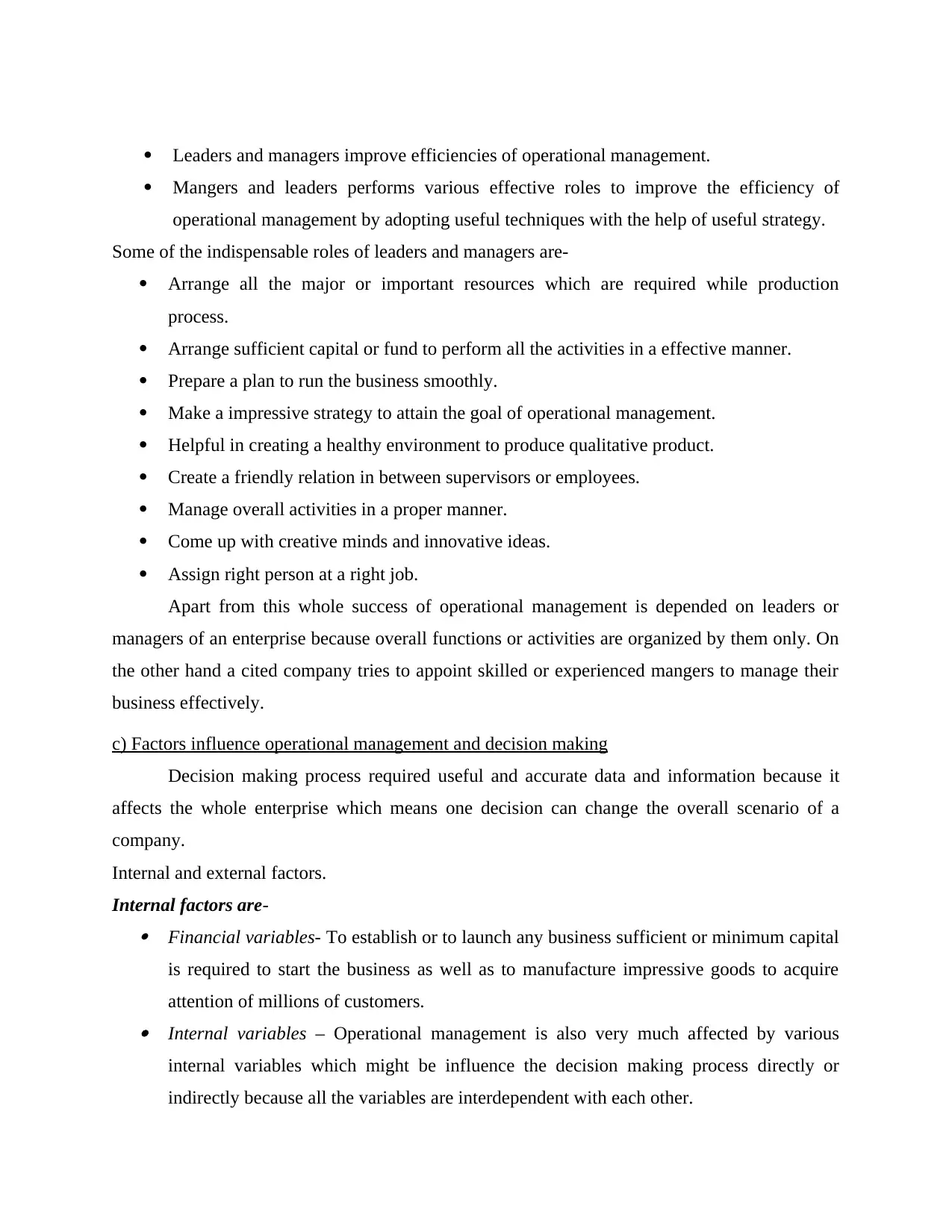
Leaders and managers improve efficiencies of operational management.
Mangers and leaders performs various effective roles to improve the efficiency of
operational management by adopting useful techniques with the help of useful strategy.
Some of the indispensable roles of leaders and managers are-
Arrange all the major or important resources which are required while production
process.
Arrange sufficient capital or fund to perform all the activities in a effective manner.
Prepare a plan to run the business smoothly.
Make a impressive strategy to attain the goal of operational management.
Helpful in creating a healthy environment to produce qualitative product.
Create a friendly relation in between supervisors or employees.
Manage overall activities in a proper manner.
Come up with creative minds and innovative ideas.
Assign right person at a right job.
Apart from this whole success of operational management is depended on leaders or
managers of an enterprise because overall functions or activities are organized by them only. On
the other hand a cited company tries to appoint skilled or experienced mangers to manage their
business effectively.
c) Factors influence operational management and decision making
Decision making process required useful and accurate data and information because it
affects the whole enterprise which means one decision can change the overall scenario of a
company.
Internal and external factors.
Internal factors are- Financial variables- To establish or to launch any business sufficient or minimum capital
is required to start the business as well as to manufacture impressive goods to acquire
attention of millions of customers. Internal variables – Operational management is also very much affected by various
internal variables which might be influence the decision making process directly or
indirectly because all the variables are interdependent with each other.
Mangers and leaders performs various effective roles to improve the efficiency of
operational management by adopting useful techniques with the help of useful strategy.
Some of the indispensable roles of leaders and managers are-
Arrange all the major or important resources which are required while production
process.
Arrange sufficient capital or fund to perform all the activities in a effective manner.
Prepare a plan to run the business smoothly.
Make a impressive strategy to attain the goal of operational management.
Helpful in creating a healthy environment to produce qualitative product.
Create a friendly relation in between supervisors or employees.
Manage overall activities in a proper manner.
Come up with creative minds and innovative ideas.
Assign right person at a right job.
Apart from this whole success of operational management is depended on leaders or
managers of an enterprise because overall functions or activities are organized by them only. On
the other hand a cited company tries to appoint skilled or experienced mangers to manage their
business effectively.
c) Factors influence operational management and decision making
Decision making process required useful and accurate data and information because it
affects the whole enterprise which means one decision can change the overall scenario of a
company.
Internal and external factors.
Internal factors are- Financial variables- To establish or to launch any business sufficient or minimum capital
is required to start the business as well as to manufacture impressive goods to acquire
attention of millions of customers. Internal variables – Operational management is also very much affected by various
internal variables which might be influence the decision making process directly or
indirectly because all the variables are interdependent with each other.
⊘ This is a preview!⊘
Do you want full access?
Subscribe today to unlock all pages.

Trusted by 1+ million students worldwide
1 out of 16
Related Documents
Your All-in-One AI-Powered Toolkit for Academic Success.
+13062052269
info@desklib.com
Available 24*7 on WhatsApp / Email
![[object Object]](/_next/static/media/star-bottom.7253800d.svg)
Unlock your academic potential
Copyright © 2020–2026 A2Z Services. All Rights Reserved. Developed and managed by ZUCOL.




